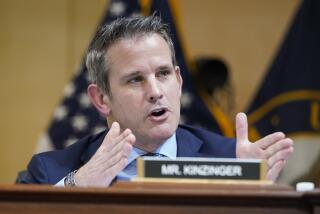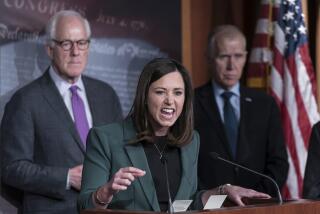GOP Candidates Dividing Along Bosnia Fault Line
- Share via
WASHINGTON — Divisions among the Republican presidential contenders over Bosnia widened Tuesday as front-runner Bob Dole moved closer to supporting the deployment of American peacekeeping troops, while several of his rivals reaffirmed their opposition to the plan.
In a speech here to the National Jewish Coalition, a GOP group, Dole did not explicitly endorse President Clinton’s plan to send up to 23,000 American troops to police the Bosnian peace agreement brokered in Dayton, Ohio, earlier this month. But in his remarks, the Kansas senator repeatedly suggested that any congressional effort to block the deployment would create unacceptable costs at home and abroad.
“Now we’re in a position where if we don’t do something to indicate our support,” Dole said, “we are in effect telling these 20,000 young men and women that we don’t support what you’re about to do.”
Dole’s position gained the support of one of his rivals, Indiana Sen. Richard G. Lugar, but the rest of the Republican field headed strongly in the other direction.
“I am opposed to sending American troops to Bosnia,” Texas Sen. Phil Gramm told the Jewish coalition. “I intend to fight the President’s resolution that will ask Congress for their endorsement of that policy.
“The President has failed to make his case,” Gramm said, adding that the failure was “for the simplest and most basic of all reasons: that case cannot be made.”
Former Tennessee Gov. Lamar Alexander and Rep. Robert K. Dornan (R-Garden Grove) similarly attacked Clinton’s plan. Two other contenders, Patrick J. Buchanan and Forbes magazine publisher Malcolm S. (Steve) Forbes Jr. have also weighed in on that side of the debate. Campaigning in Iowa, Buchanan called the GOP leadership’s response to Clinton so far “pathetic.”
The contrasting remarks suggest that the Bosnia issue may increasingly become a point of distinction between the GOP presidential contenders. While the general public is split roughly evenly about the proposed Bosnia mission, the plan has inspired intense opposition among many Republican partisans. And in a race that has generated relatively few sharp issue distinctions among candidates, the Bosnia issue could provide a new avenue for challenging Dole--at least until American forces are actually in place.
Dole seemed resigned both to eventually backing the plan and to taking fire from his rivals over it. “I’m certain some of my opponents on the Republican side will have a field day,” he told the Jewish coalition. “But there comes a time when you have to be responsible, too, in America. Leadership means responsibility.”
Lugar went even further than Dole, telling reporters that while Congress will seek to impose conditions on the mission, there was virtually no chance it would seriously attempt to block deployment of the troops. “If you are asking if there are ways that Congress can deny troops going to Bosnia, the answer is no,” Lugar said. “They are going to go. The question now is to define the mission, the exit strategy. . . . “
And Lugar, a former chairman of the Senate Foreign Relations Committee, offered a biting retort to those Republicans who have spoken out against the troop deployment, suggesting that his rivals were so firm in their opposition because they did not fully understand the stakes involved.
“Charitably, these are folks who have not grappled with very much in terms of foreign affairs or defense policy,” Lugar said. “It won’t work if you are President,” he added. “I would say: ‘You’d better grow up. Better begin to think through again what the stakes for this nation are.’ ”
The comments by Dole and Lugar reflected a spreading conviction in the capital that Congress will accept deployment of the American troops as part of the planned 60,000-member NATO peacekeeping force.
But those on the other side of the debate warned that Clinton’s plan would only lead to deeper U.S. involvement in the Balkans.
Alexander, for example, told reporters that the United States should not send ground troops to the region unless the country is committed to ensuring the survival of the Bosnian government if the peace agreement breaks down and hostilities with the Bosnian Serbs are rekindled.
“Every step we take to involve ourselves in the war is a Vietnam-like commitment unless we’re prepared to commit sufficient forces to see it all the way through to the end,” Alexander said.
In his remarks, Dole argued that the Administration would not need to be asking for troops now if it had supported his legislation to unilaterally break the international arms embargo against the Bosnian government.
“We now have an unfortunate situation,” Dole said. “Either Congress agrees to a military deployment that looks suspiciously like Lebanon in 1983, or, on the other hand, we unravel a presidential commitment . . . which would be at great cost to the solidarity and credibility of NATO and America itself.”
Though Dole has repeatedly expressed skepticism about Clinton’s plan to commit troops to police a peacekeeping agreement, earlier this year he did indicate willingness to insert American forces into Bosnia under another circumstance: to evacuate U.N. peacekeeping troops who had threatened to withdraw from the region if the United States broke the arms embargo, as Dole urged.
On Tuesday, both Dole and Lugar said they will press the Administration for greater specificity on plans to arm and train the Bosnian government forces while the international peacekeepers are in place.
“We will never have an exit strategy if they are not prepared to defend themselves,” Dole said.
More to Read
Get the L.A. Times Politics newsletter
Deeply reported insights into legislation, politics and policy from Sacramento, Washington and beyond. In your inbox twice per week.
You may occasionally receive promotional content from the Los Angeles Times.










